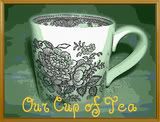- older and younger generation
- children and essential catching up around the house
- house and the garden
It is easy to write as though I had come to the right balance but this is still a work in progress.
We started out with a family celebration alongside a trip to the sea. This balance seemed to work reasonably well-that was before life got complicated.
Monday was meant to be a day on our church's annual outing but instead, Grandma was admitted to hospital. We managed to get the children to the outing-there was no point them hanging around hospital, all day. We are hoping that Grandma will be able to come home soon.
I had always intended to do some catch up this week but there just seemed a vast amount to do. I'm talking essentials and yes, not even that is all done. Middle Son has done sterling work in the garden which was needed.
We did fit in another outing to Knole Park in the driving rain and eventually, some hail.
The clothes that I thought were waterproof proved that they weren't! I thought that we were relatively hardy about the rain but we all wanted to go in the dry. The State Rooms are fascinating. The guides kept telling us that they were cold but after the rain, it was a relief not to be wet and being dry felt warm.
Half term is a time to read. I seem to have several half finished books.
David Cloud's Keeping the Children continues to challenge. Plenty of food for thought.
I'm pulling together some books for a children's book club which is an excellent excuse to read children's books. Jim Cromarty's biography of Hudson Taylor The Pigtail and Chopsticks Man is the first that I am reading for this purpose. Do let me know if you can recommend books about different countries of the world for 7-11 year olds.
On the way out to hospital, on Monday, I pulled a book off the shelf to have something to read while waiting. As a result, I am a fair way through Georgi Vin's Three Generations of Suffering. A thought provoking read about Christians in an atheistic society.
For light relief, I downloaded Choosing Home:20 Mothers celebrate staying at home. The chapters are short vignettes of different mothers and their perspective on staying at home.
The read alouds are on hold. Does that mean that they are not too successful, if we can wait a week? Younger Daughter has wanted a couple of Dickens' simplifications over the holiday. Dickens isn't quite the same simplified! Aldophus Tips, by Michael Morpurgo, as an audio book is currently being enjoyed for what must be the fourth or fifth time.
One text that has seemed so relevant this week has been
If any of you lack wisdom, let him ask of God, that giveth to all men liberally, and upbraideth not; and it shall be given him.
James 1 v5
If you enjoyed this post you may like to follow Delivering Grace by Google Friend Connect, G+,Facebook, Pinterest or e-mail.




















